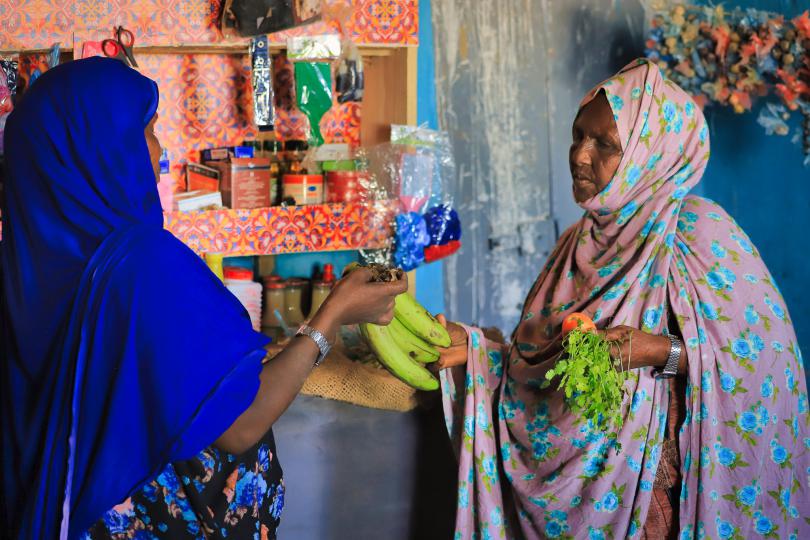THE EUROPEAN UNION AND MOLSA ARE HELPING FAMILIES RECOVER FROM THE COVID-19 CRISIS IN SOMALIA

Maryan is a 70-year-old grandmother living in an Internally Displaced Peoples (IDP) camp in the Mudug region of North Eastern Somalia with her eight grandchildren— seven of them are orphans who have recently lost their mother. Maryan arrived in this camp 11 years ago after fleeing from a conflict in southern Somalia.
When she arrived at the camp, she opened a small shop where she sold mangoes and bananas, milk, cold beverages, balloons and candies. Her shop became a source of income for the family, and she used to help feed her grandchildren with little she earned from the shop. As a result of the start of the COVID-19 pandemic, many families experienced economic hardships and Maryan had to close her shop, leaving her grandchildren without food.
Through the EU-funded SAGAL project, implemented by the Ministry of Labour and Social Affairs (MoLSA), the Somali Cash Consortium and Save the Children provide social transfers to vulnerable elderly to help them recover from the pandemic and protect small businesses that may contribute to their family's income. Maryan and her family are among 12,000 families who received regular, predictable and reliable social transfers with a value of $US 20 in the last six months as part of one of the four social transfer models as part of the SAGAL programme, targeting elderlies at higher risk of contracting COVID-19. Maryan's family could pay off some of their debt and buy food for her grandchildren with this support.
Maryan says:
"I came from Mogadishu due to conflicts. In Mogadishu, we were happy and owned a small business to support my family. However, conflicts increased in our neighbourhood, and we were forced to relocate to Galkayo. Now we live in this camp.
When we came to the IDP camp, we were welcomed by one of my relatives. I had some small savings from my shop in Mogadishu, so I decided to open a new shop here in the camp. It helped me resettle and earn money to feed my children.
Unfortunately, my shop suffered from the impact of the COVID-19 pandemic. Customers decreased and I could not pay the rent and earn enough money from the shop to feed my grandchildren.
The situation worried me, and I didn't know how to support my family. Fortunately, we were selected to benefit from this programme. We now receive cash support from MoLSA and the European Union through Save the Children.
The cash transfer assistance we received did not have any conditions. I am grateful to Allah and thanks to the government and the European Union, I can now use this money to help my family and pay some of my debts. In the near future, I intend to re-start my little business and help my family become independent.”

About the programme:
The overall objective of this social transfer model is to alleviate the economic strains resulting from the COVID-19 pandemic and protect households with female and male elderly, who are most at risk of contracting the virus.
The Cash Consortium is implementing this cash-based social transfer model through the provision of unconditional social cash transfers to 12,000 households across the country. The focus is given to elderly at risk of contracting the virus who are normally excluded from social networks.




